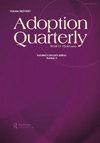研究印度城市不孕不育的生活经历和对收养儿童的看法
IF 0.6
Q3 SOCIAL WORK
引用次数: 3
摘要
摘要不孕不育正在成为印度城市一个主要的健康问题。因此,印度城市的不孕夫妇倾向于依靠辅助生殖技术(ART)生育孩子。一些媒体报道强调,印度城市的不孕夫妇只有在所有成为亲生父母的可能性都已耗尽的情况下才打算收养孩子。几项研究调查了印度城市不孕不育与辅助生殖技术之间的关系。然而,在印度,关于不孕夫妇对收养孩子的态度的学术研究有限。本研究采用定性视角,运用功能主义理论框架,考察了印度果阿城市不孕夫妇对收养子女看法的不同因素。在此过程中,该研究还反思了这些夫妇不孕不育和性别角色实现之间的交叉点,以定期了解不孕不育的生活经历。本文章由计算机程序翻译,如有差异,请以英文原文为准。
Examining Lived Experiences of Infertility and Perceptions Toward the Adoption of Children in Urban India
Abstract Infertility is emerging to be a key health concern in urban India. As a result, infertile couples in urban India tend to rely on assisted reproductive technologies (ARTs) for a child. Several media reports have highlighted that infertile couples in urban India intend to adopt a child only when all possibilities of becoming biological parents have been exhausted. Several studies have examined the relationship between infertility and assisted reproductive technologies in urban India. However, there is limited academic scholarship on the attitudes of infertile couples toward the adoption of children in India. Adopting a qualitative lens and using the functionalist theoretical framework the present study examines the different factors that shape the perceptions toward child adoption among infertile couples in urban Goa, India. In the process, the study also reflects on the intersections between infertility and gender role fulfillment among these couples to understand the lived experience of infertility on a regular basis.
求助全文
通过发布文献求助,成功后即可免费获取论文全文。
去求助
来源期刊

Adoption Quarterly
SOCIAL WORK-
CiteScore
1.60
自引率
12.50%
发文量
3
期刊介绍:
Adoption Quarterly is an unparalleled forum for examining the issues of child care, of adoption as viewed from a lifespan perspective, and of the psychological and social meanings of the word "family." This international, multidisciplinary journal features conceptual and empirical work, commentaries, and book reviews from the fields of the social sciences, humanities, biological sciences, law, and social policy. In addition to examining ethical, biological, financial, social and psychological adoption issues, Adoption Quarterly addresses continuity in adoption issues that are important to both practitioners and researchers, such as: negotiation of birth and adoptive family contact.
 求助内容:
求助内容: 应助结果提醒方式:
应助结果提醒方式:


